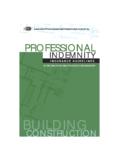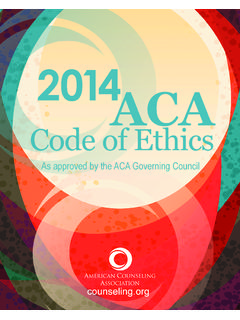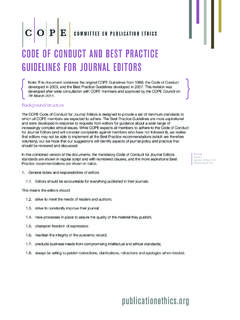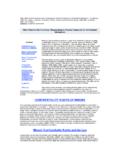Transcription of National Code of Practice for the Construction Industry - APCC
1 National code ofPractice for theConstruction IndustryTowards Best PracticeGuidelinesAustralian Procurement and Construction Council1999 Australian Procurement and Construction CouncilPO Box 106 Deakin West ACT 2600phone (02) 6285 2255fax (02) 6282 principles5 Responsibilities and Relationships5 Clients5 Service providers: contractors, subcontractors,consultants, and suppliers5 Employer and Industry associations6 Unions6 Competitive behaviour7 Ethical principles7 Implementation of the ethical principles8 Collusive practices9 Continuous improvement and best practice10 Commitment to continuous improvement10 Best practice10 Workplace reform13 Occupational health, safety & rehabilitation19 Environmental management21 Industrial relations24 Project planning26 Cooperative contracting30 Contract mangement34 Non-adversarial approach35 Security of payment37 Subcontractors.
2 Consultants and suppliers37 Contents1999page 1 Towards Best Practice GuidelinesContentsCompliance principles39 Compliance39 Monitoring by clients39 Exchange of information40 Complaints concerning government agencies41 Contact details42page 21999 ContentsTowards Best Practice GuidelinesThe National code of Practice for the Construction Industry (theNational code ) was developed jointly by the Australian Procurementand Construction Council and the Departments of Labour AdvisoryCommittee. The National code has been endorsed and adopted byCommonwealth, State and Territory Governments through theProcurement and Construction Ministers Council and the LabourMinisters codes or new codes developed by individual governmentswill be consistent with the principles established in the NationalCode, but will be tailored to suit the priorities and circumstancesrelevant to particular jurisdictions.
3 Where a Commonwealth, State, orTerritory has guidelines to support their code , those guidelines willapply in that Guidelines are aimed at encouraging continuous improvementand best Practice approaches by all parties in the Guidelines also support the National strategies to supportindustry development outlined in Construct Australia: Building aBetter Construction Industry in 3 Towards Best Practice GuidelinesIntroduction Construction Industry includes all organised activities concernedwith demolition, building, landscaping, maintenance, civilengineering, process engineering, mining and heavy engineering. Applicable code means the applicable jurisdictional code ; that is,either the National , State or Territory code .
4 Party or parties includes but is not limited to: clients, serviceproviders ( principal contractors, contractors, subcontractors,suppliers, consultants, employees), unions (their officials, employeesand members), and Industry associations whilst undertaking arepresentative role. Tenders prices, bids, quotations, proposals and expressions 41999 DefinitionsTowards Best Practice GuidelinesResponsibilities and relationshipsThe National code and these Guidelines encourage co-operation,ethical behaviour, continuous improvement and best Practice byclients and service providers in the Construction addition, it is expected that employer and Industry associations andunions will contribute to the achievement of best Practice standardsin the are expected to.
5 Comply with the applicable code and take action to address Codeissues inform parties of their responsibility to comply with the applicableCode ensure an appropriate level of expertise is available in all phasesof procurement adopt a cooperative, non-adversarial approach in all businessdealings and relationships in all combinations, and at all levels promote and strive to achieve best providers: contractors, subcontractors,consultants, and suppliersContractors, subcontractors, consultants and suppliers are expectedto: comply with the applicable code and take action to address Codeissues adopt a cooperative, non-adversarial approach which must extendto all business dealings and relationships in all combinations, andat all levels improve skills, financial planning, management and businessefficiencyNational principles1999page 5 Towards Best Practice GuidelinesNational principles maintain high standards in employee and workplace relations,OHS&R and environmental management promote and strive to achieve best and Industry associationsEmployer and Industry associations are required to: work with clients, contractors, subcontractors, consultants,suppliers and unions to improve.
6 Relationships, efficiency,productivity, industrial and workplace relations, OHS&R andenvironmental management performance, and the competitivenessof the Construction Industry encourage compliance by members with the applicable code establish internal mechanisms under their rules or code (s) ofconduct to deal with transgressions from the applicable code adopt and promote a cooperative (non-adversarial) approach in alldealings and relationships promote and strive to achieve best are required to: work with clients, contractors, subcontractors, suppliers andemployer associations and other Industry participants to achievenew and improved standards in: industrial and workplacerelations, OHS&R, environmental management, productivity, andin the competitiveness of the Construction Industry encourage compliance by members and union officials with therequirements of the applicable code establish internal mechanisms under their rules or code (s) ofconduct to deal with transgressions from the applicable code adopt and promote a cooperative (non-adversarial)
7 Approach in alldealings and relationships promote and strive to achieve best 61999 National principlesTowards Best Practice GuidelinesEthical principlesThe ethical principles outlined in the National code were framedwith the expectation that they would be embraced as a statement ofethics that underpin best Practice tendering procedures, not only bythose to whom they are directed but also by employer and industryassociations in the Construction embracing the ethical principles, significant benefits will flow tothe community and the Construction Industry as a whole throughimproved service respect of individual parties to a particular tender process clientsand service providers will benefit directly through reduced costs: a tender process underpinned by the ethical principleswill provide service providers with the confidence that their tenderwill receive fair and equal consideration in accordance with theevaluation criteria described in the tender documents.
8 This meansthat the effort and cost of tendering is not wasted throughinappropriate selection or assessment processes and should ultimatelyreduce costs to both clients and service improvement: confidence in the tender process creates aclimate which encourages innovation and continuous improvement,on the basis that effort will be fairly rewarded in the long behaviour1999page 7 Towards Best Practice GuidelinesCompetitive behaviourImplementation of the ethical principlesTo give effect to the ethical principles, tendering processes need toset out in detail the following obligations:Clients obligations Fair dealingfl Commitment to proceedfl Negotiationsfl Confidentiality Project definition Tender documents Selection criteria Procedures for inviting tendersfl Advertisement of tendersfl Handling enquiries by tenderersfl Issuing amendments to tender documentsfl Receipt of tendersfl Evaluation of tenders Outcomes of tendersTenderer s obligations Responding to invitations to tender Review of tender documents Formulation of tenders Statutory and legal obligations Tender conformance Competitive behaviour Submission of tenders Enquiries from the client Confidential informationpage 81999 Competitive behaviourTowards Best Practice GuidelinesCollusive
9 PracticesCollusive tendering practices are inconsistent with the establishmentand maintenance of the ethical business practices which mustunderlie good working relationships between any client and anyservice providers seeking to do business with it, and between practices have both direct and indirect adverse impacts on thecost of projects. They include: direct coststhrough the inclusion of allowances for unsuccessful tenders intender prices and special fees payable to employer and industryassociations indirect coststhrough reduced effectiveness of the competitive need to ensure to the maximum extent possible that thepractice of unsuccessful tenderers fees and other collusive practicesdo not 9 Towards Best Practice GuidelinesCompetitive behaviourCommitment to continuous improvementThe pursuit of best Practice requires total organisational commitmentto continuous improvement, which is essential if the Industry is to.
10 Maintain its influential position in the economy, and to be internationally , as clients, will encourage the attainment of bestpractice by all participants. Commonwealth, State and TerritoryGovernments will also work together to develop a compatible rewardand incentive performance will be encouraged and incentives providedfor enterprises which show significant improvement. This includesoutstanding performance in supply chain management incentives include more opportunities to do business and longerterm practiceThe reason an enterprise sets out to achieve Best Practice is that itsimply makes good business strategies are as diverse as the measures which must be used togauge performance and identify deficiencies which need to approach employed by an enterprise for delivering Best Practicewill be framed according to the nature of the organisation, resources,market position, products and services offered.
















